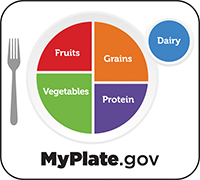Nutrition for Wound Healing
If you have any type of new or chronic wound, good nutrition can help your body's overall health to help support healing. Nutrients from foods help your body build and repair tissue and heal wounds. Good nutrition can also help you fight infection. During healing, your body may need more calories and protein. And if you have diabetes, it’s very important to control your blood sugar to help your wound heal.
Nutrients you need
Nutrition helps give your body the energy it needs to repair tissues and heal wounds. Nutrients you need from food to keep you healthy include:
-
Protein. Protein can help build tissue and prevent infections. It’s found in meats, fish, eggs, cheese, milk, nuts, and beans.
-
Carbohydrates. These help give your body the energy it needs to heal. Carbohydrates are found in grains, fruits, beans, and other legumes.
-
Fats. Healthy fats help your organs, skin, hair, and brain. They also help your body absorb certain vitamins.
-
Vitamins. These include vitamins C, D, B-6, B-12, folate, and others. These help your body repair tissues, use energy, and do many other processes.
-
Minerals. These include iron, magnesium, calcium, zinc, and others. These help with many things, such as making sure your cells have enough oxygen, your nervous system works well, and your bones stay strong.
Preparing healthy meals
When making meals each day, follow the guidelines from MyPlate. Your basic daily diet should include:
-
Fruits and vegetables. Fruits may be fresh, canned, frozen, or dried, and may be whole, cut up, or puréed. Vegetables may be fresh, frozen, canned, or dried. Make half your plate fruits and vegetables.
-
Grains. All foods made from grains are part of the grains group. These include wheat, rice, oats, cornmeal, and barley. You can find grains in foods such as bread, pasta, oatmeal, cereal, tortillas, and grits. Grains should be no more than a quarter of your plate. Aim to make whole grains at least half of your daily grain intake.
-
Protein. This group includes meat, poultry, seafood, beans and peas, eggs, processed soy products such as tofu, nuts, including nut butters, and seeds.
-
Dairy. All fluid milk products and foods made from milk that contain calcium such as yogurt and cheese are part of the dairy group.
-
Oils. These are fats that are liquid at room temperature. Oils are not a food group, but they provide important nutrients your body needs. They include canola, corn, olive, soybean, and sunflower oil. Some foods are naturally high in healthy oils, such as nuts, avocados, olives, and some fish. Foods that are mainly oil include mayonnaise, certain salad dressings, and soft (tub) margarines.

Getting enough protein
Protein helps your body build and repair tissues. Protein also helps your immune system work well. This helps protect wounds from infection and let them heal. Infection can delay healing. To get enough protein while you’re healing, you can:
-
Add protein to every meal. This includes turkey, chicken, beef, pork, lamb, fish, shellfish, eggs, and cheese. Protein is also found in foods such as nuts, nut butters, beans and other legumes, seeds, and tofu. You can also get protein from animal milk and soy milk.
-
Have protein supplements between meals. There are many kinds of protein drinks and other protein supplements. These have protein from whey, soy, and other sources. If you have trouble digesting lactose or soy, ask your healthcare provider which type of protein supplement may be best for you.
Adding vitamin C
Research has shown that vitamin C can help with tissue health and repair. Add vitamin C to your diet while your wound is healing. You can get vitamin C in your diet by eating or drinking juice from citrus fruits such as oranges, clementines, grapefruits, lemons, and limes.
Other food sources of vitamin C include tomatoes, potatoes, strawberries, green and red bell peppers, broccoli, Brussels sprouts, and kiwifruit. You can also get vitamin C in supplement form via tablets, chewables, and other types of supplements.
Adding zinc
Zinc helps your body's immune system and helps make protein to heal wounds. To add zinc to your diet, choose whole grains and eat protein, such as eggs, meat, dairy, or seafood. Zinc is better absorbed from animal sources such as beef and seafood. Good vegetarian sources include wheat germ, beans, nuts, and tofu.
Controlling your blood sugar
If you have diabetes and you have wounds, it’s important to control your blood sugar. High blood sugar can slow wound healing and make it easier for wounds to get infected. Take good care to manage your diet, take your diabetes medicine, and measure your blood sugar as directed. Tell your healthcare provider if your blood sugar is not under control. They can help you get it back on track.